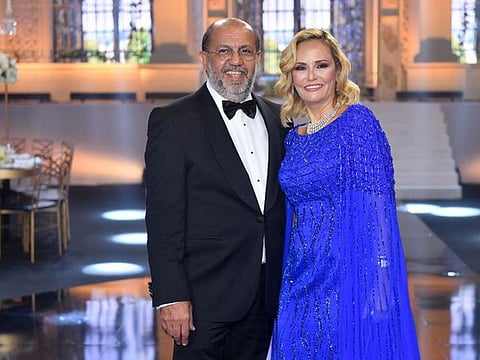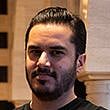UAE success story: Fadi Al Safadi, Lebanese butcher who turned top restaurateur in Dubai
Fadi Al Safadi runs a successful family-owned chain of restaurants in Dubai

Dubai: Fadi Al Safadi, 59, founder and CEO of Al Safadi restaurant, was just 13-years old when he started working as a butcher for his father Fadl in his native Lebanon.
“The year was 1976. My father was a renowned butcher. He ran a shop in Zeidaniye, Beirut where I worked for two years. He would supply meat to high-end restaurants.”
Little did he know that this would be the beginning of a successful career in the restaurant business.
“My time working for my father laid the foundation for something big to come in my life. He taught me to be prepared for everything. For one year, I worked as a cleaner in my father’s shop before he taught me the skill of butchery. My father was my best teacher. From treating customers well, to developing skills to improving your quality of service, I learned everything from him. I was fortunate to have him as my father,” Fadi said with great pride and joy as he recalled his past.
One of the things my father told me was that we should learn to manage our money and that it should not be the other way around.

“Through all these years in my career, I have learnt five things that are important to running a restaurant business – price, quality, quantity, service and cleanliness of the premises. Once these criteria are met, there is nothing that can stop a business from growing from strength to strength.”
From 1976 to the late 1980s, Fadi worked as a butcher in Beirut, before moving to Saudi Arabia. He also dabbled in the textile and clothing industry until 1994 by importing them from Turkey for his customers in Lebanon.
Learning the business
“One of the things my father told me was that we should learn to manage our money and that it should not be the other way around. This is one of the fundamental rules of running a business wisely.”
Fadi recalled he picked up skills from his father, which put him in good stead. “People thought I was trained at a special school to know these skills,” he said.
Pictures: Blast from the past
“For example, meat has to be cut, trimmed with precision from larger wholesale portions into steaks, chops, roasts and other cuts. Knowing the anatomy of animals is equally important. I learned this on the job. Your knife is your partner in crime. Sharpening the knife to the right extent is critical in cutting and chopping the meat to precision,” he explained.
“This knowledge has laid the foundation for all my endeavours,” Fadi credits his father for all his success.
First restaurant
In 1994, finally, Fadi founded Al Safadi restaurant in Beirut before heading to Dubai in 1999. In 2000, he started the restaurant brand in Dubai where he found his true success.
“The after-effects of a long drawn civil war which went on from 1975 until 1990 were still there in Lebanon. I was escaping this. I wanted to make a fresh start in a place with new beginnings.”
And there is no place like UAE for new beginnings.
Al Safadi in Dubai
Fadi opened their first Dubai restaurant on August 16 in Rigga Road, Deira, in 2000.
“There are 252 employees working there currently. The restaurant has a seating capacity of 308. After that, we opened our Sheikh Zayed Road branch in DIFC next to Dusit hotel on March 18 2004. It is currently under renovation. Our Umm Al Sheif branch opened on Jan 8 2017. The restaurant has a seating capacity of 398 seats. The next branch we opened was at The Pointe, on December 11 2018. Our newest branch is in Motor City, which opened on September 10 2021. The restaurant has a seating capacity of 310 with 114 employees working there.”
Choosing the venues
The Al Safadi network of restaurants followed the growth of Dubai as it spread across the city.
“The first Al Safadi restaurant opened in Deira, when Al Rigga Road served as a hub for businesses, residents living there and the tourists who came to the city. The restaurant rapidly earned a reputation for serving incredibly high-quality authentic Lebanese cuisine to those who worked and lived in the area,” Fadi’s son Abed Safadi who works in the family business as Marketing Manager said.
“As Dubai expanded southwards, the Trade Centre District emerged as a bustling business hub. We grew with the city, opening our Sheikh Zayed Road restaurant where we served a growing population in the heart of the business district,” Abed said.
Al Safadi gained popularity here as many international visitors returned here year after year for exhibitions and corporate events, according to him.
“Going with the city’s prosperity, we expanded across Dubai, opening our third restaurant in Umm Al Sheif to cater for Dubai’s fast-growing and increasingly multicultural population here before expanding with a stunning fine dining experience at The Pointe on the Palm Jumeirah,” Abed said.
As Dubai expanded southwards, the Trade Centre District emerged as a bustling business hub. We grew with the city

“Over the years the restaurant has become the go-to destination for daily eat-out, for families and friends to enjoy celebrations,” he said.
Diverse food experience
For any restaurant, the uniqueness of the food they offer is the immediate key to its success. Al Safadi is no different.
“Our menu has a large variety of options. It caters to someone who wants to grab a quick bite, to someone who wants to leisurely sit down for a dining experience. What we do is cater to a variety of people,” said Fadi’s eldest son, Fadl who is the chief operating officer.
“Lebanese cuisine is famous for its vegetarian dishes. We have a broad target audience, something we are very proud of,” said Fadl.
Family is a big support
Fadi is sure he could not have achieved anything without the support of his wife, Mona.
“She believes in the concept that men bring in the money to the house, and women run it with as much efficiency as possible,” he said.
Fadi said his sons Fadl and Abed have supported him through and through.
“Ever since their graduation, they joined the family business to help me expand. Fadl and Abed have restructured the organisation, and ensured everyone employed in the company is happy in their roles. They introduced new concepts into the business that smoothened the process of running a business,” he said.
Central kitchen, workflow management
Abed said he and his brother introduced the concept of a central kitchen in their father’s business for the very first time.
“The central kitchen, also called a central production unit (CPU), is essentially our kitchen space which we use for the production of meals or individual ingredients before we pack them to different locations. My brother and I also worked on setting a proper administration within the business to run things smoothly. We created departments, and picked the right people to head these departments. It just made things easier,” Abed said.
Taking care of the staff
Fadl said the restaurant has 700 staff employed across its various branches. A happy, motivated staff is vital for the success of any food business.
“Our staff is our strength. We have trained them well. We are a success because we work as a team. Many of my staff have been with me since the restaurant was launched. Many of them came on a monthly salary of Dh4,000. Today, some of them are earning more than Dh25,000 a month.
Beating Covid
The crippling covid lockdown that went on for two years was the biggest challenge for any business in recent times. One of the worst affected was the restaurant business.
“The lockdown affected us just as it did every other business. But we took stock of things. Home delivery became a huge concept and we did it successfully. There will always be challenges in the country. One needs to just find a way out,” Abed said.
“The pandemic affected everyone. Some people came out stronger, while others did not survive. However, we worked hard. The delivery business became the thing. We worked so hard we not only sailed through but also opened a branch recently amid the pandemic,” Fadi says.
Abed said there is no substitute to hard work. “I have always seen my father work hard for a living. Even as a child I saw my father work for 18 to 19 hours. We never saw our father at home. My brother and I saw our father only at the restaurant. So our father’s restaurant was our favourite hangout. My brother and I would always spend time learning from my father and our team. In Al Safadi, we are just one big family.”
Sign up for the Daily Briefing
Get the latest news and updates straight to your inbox


